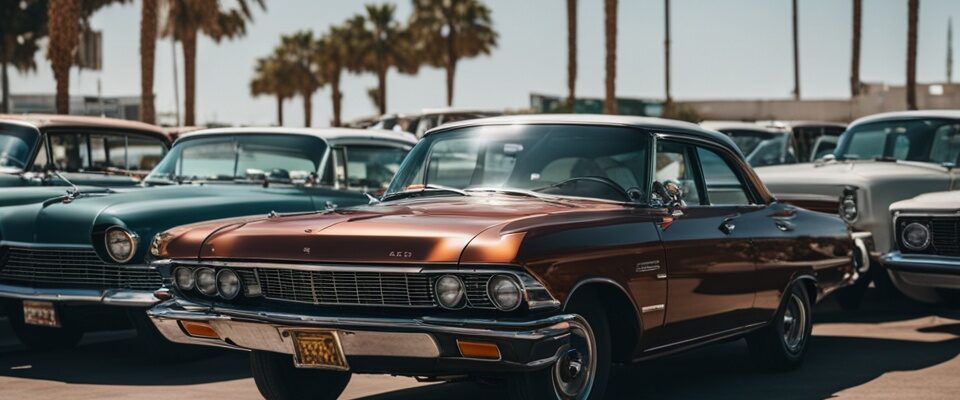Buying or Selling a Vehicle in Costa Rica | What Expats Need To Know
Buying or selling a car in Costa Rica might seem hard at first, especially for expats not used to the local rules. But, having a car here gives you more freedom, especially if you live away from big cities. So, what important steps and things do you need to know for this task?
This guide is here to help expats be prepared and make smart choices for their transport in Costa Rica. It talks about everything from choosing to import a car or buy one locally, to what you need to know legally. You’ll also learn about the costs, how to budget, and get help after you make the deal.
Key Takeaways
- Buying or selling a vehicle in Costa Rica involves a complex process, often requiring the involvement of a public notary.
- Notary fees and registration costs can be significant, accounting for a substantial portion of the overall expenses.
- Expats have the option to import a vehicle or purchase a new or used car locally, each with its own set of pros and cons.
- Thoroughly researching the Costa Rican car market and understanding the factors to consider can help expats make an informed decision.
- Financing options, including dealership plans and local bank loans, are available, but may be more challenging for expats compared to Costa Rican citizens.
Introduction to Buying or Selling a Vehicle in Costa Rica
Having a car in Costa Rica can make life easier, especially for expats away from big cities. But, buying or selling a vehicle here has more steps than in many places. You have to deal with lots of laws and paperwork. We’ll help you understand what to do when buying or selling a car in Costa Rica.
In Costa Rica, owning a car means dealing with registration fees and taxes. If you’re buying used, which is common, knowing market prices is important. The market for used cars can have great deals and big price differences. It’s key to know about local dealerships and what they offer when you’re thinking about getting a car.
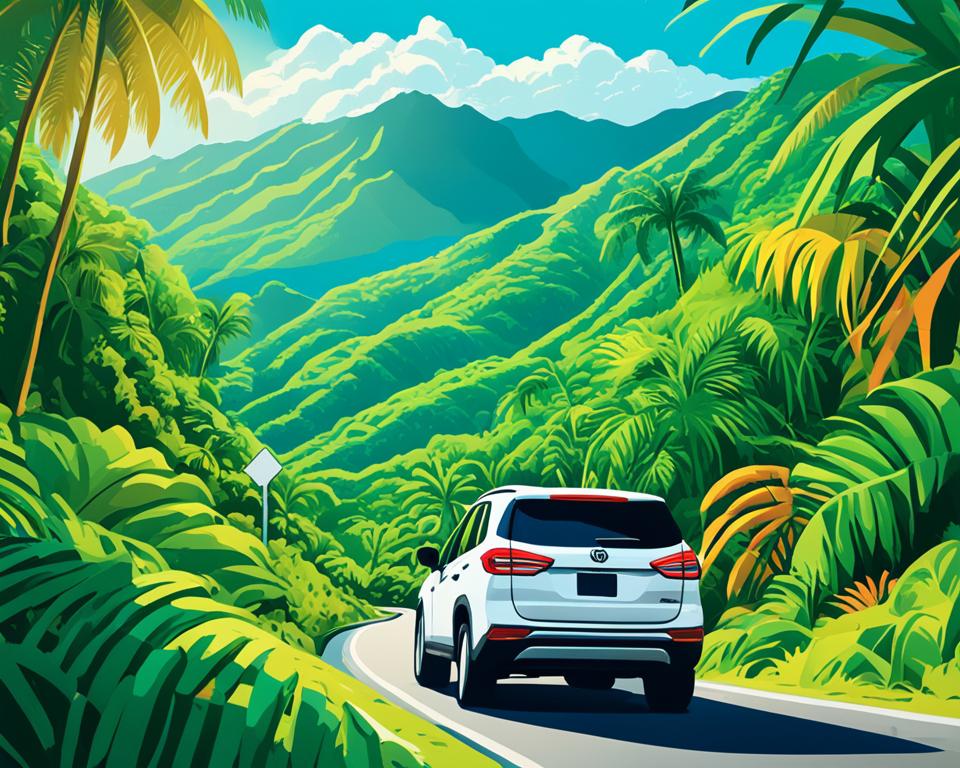
Getting a handle on Costa Rica’s car scene is crucial for expats wanting good and affordable vehicles. Learning about local taxes and the market helps make smarter car choices. By being informed, expats can match their car needs with their budget. Doing research is well worth it!
Importing vs. Buying Locally
Expats in Costa Rica face a tough choice when getting a vehicle. They can either bring their own car from home or buy one in Costa Rica. Each choice comes with its own good and not-so-good points that need some thinking through.
Importing a Vehicle
Bringing a car to Costa Rica can be hard and expensive. The government charges import duties of up to 80% of the car’s value. Usually, these fees are more than what the car is worth in the U.S., for instance.
Yet, there are some upsides. The car won’t have as much rust or wear as many used cars in Costa Rica do. You might also know the car’s history and can find easier-to-get parts for some models, like Toyota, here.
Buying a New or Used Car in Costa Rica
If you buy a car in Costa Rica, the process is simpler. But the costs can be higher than in other places. For example, an old compact SUV might cost you between $8,000-$10,000.
Here, you can choose between new and used cars. New ones have warranties and the latest features. But, they are often 25-30% more expensive than in the U.S. Used cars are cheaper, but they might need more care and last for fewer years.
Local websites like crautos.com and encuentra24.com are great for finding cars. Don’t forget, it’s common to bargain on the price. Always have a mechanic check the car before you buy. The roads here can be rough on vehicles.
| Consideration | Importing a Vehicle | Buying Locally |
|---|---|---|
| Cost | High import duties (50-80% of car’s value) | Prices tend to be higher than other countries |
| Vehicle Condition | May be in better condition with less rust | Varies, but may require more maintenance |
| Parts Availability | Easier for certain makes (e.g., Japanese models) | Availability may vary depending on the brand |
| Convenience | Complex process, takes around 3 months | Relatively straightforward, but requires notary involvement |
Deciding whether to import or buy in Costa Rica depends on your situation. Look at what you need, your budget, and what you prefer. By carefully considering both options, you can pick the one that’s best for you.

Researching the Costa Rican Car Market
Thinking about buying a car in Costa Rica? Before you do, research is key. Look into how cars save on gas, the costs to keep them running, easy access to parts, and what cars are popular. This helps you find the right car that fits your budget.
Factors to Consider
In Costa Rica, it’s smart to check car prices costa rica, car taxes costa rica, car financing costa rica, and car insurance costa rica. Also, learn about automotive laws costa rica and car import regulations costa rica. This info will help you when you’re ready to buy.
Popular Car Brands and Models
Costa Rica loves cars that handle its varied roads well. Look at CR Autos and Encuentra24 for car prices. They are go-to sites for comparing prices and seeing what’s out there.
| Car Brand | Popular Models | Average Price Range |
|---|---|---|
| Toyota | Corolla, RAV4, Hilux | $12,000 – $25,000 |
| Hyundai | Tucson, Accent, Santa Fe | $10,000 – $22,000 |
| Honda | Civic, CR-V, Pilot | $11,000 – $23,000 |
| Kia | Sportage, Rio, Sorento | $9,000 – $20,000 |
| Suzuki | Vitara, Swift, Jimny | $8,000 – $18,000 |
Getting to know the car market brings big benefits. It lets expats in Costa Rica make smart choices. This means choosing a good car that meets their needs and their wallet.
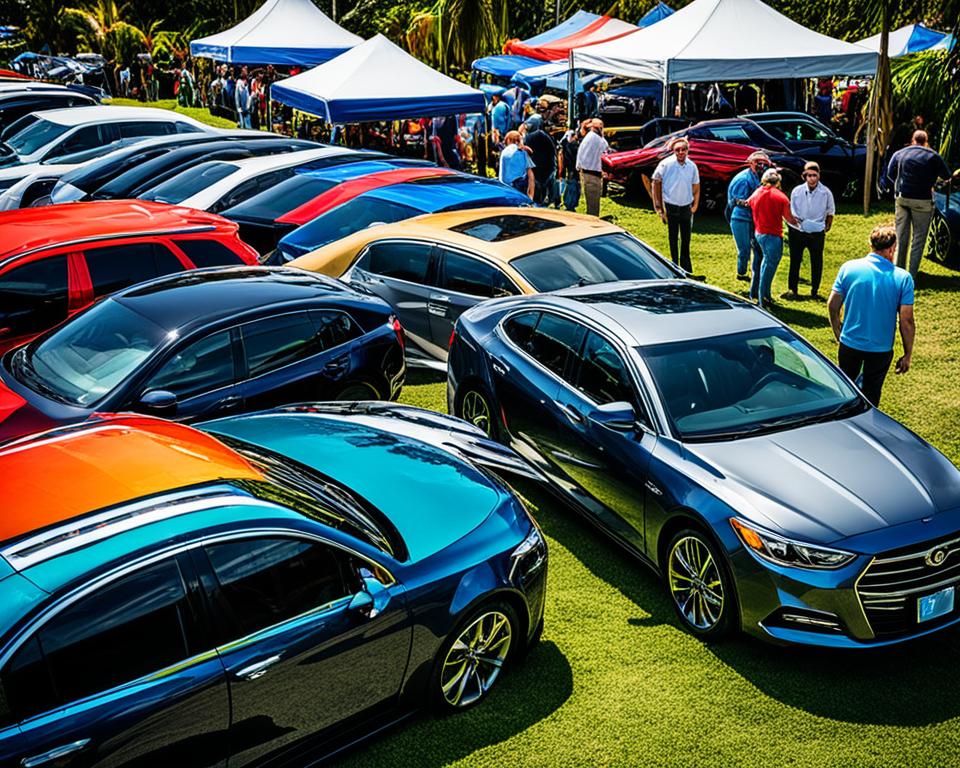
New vs. Used Cars: Pros and Cons
Expats face a tough choice when buying a car in Costa Rica. They have to think hard about new vs used car choices. Each path brings different benefits and problems that relate to what you can spend and your needs.
New vehicles in Costa Rica are fresh from the dealership and have up-to-date features. This means you can relax, knowing your car is not likely to break down soon. But, the first hurdle is the higher initial cost these shiny cars come with. This is because car prices are up in Costa Rica due to steep import taxes.
Opting for a used car in Costa Rica can save you quite a bit of money. There is room for bargaining on the price too. Yet, older cars might need more maintenance and won’t last as long. In some cases, getting car financing or insurance for a pre-owned vehicle might be harder.
| Considerations | New Cars | Used Cars |
|---|---|---|
| Initial Cost | Higher | Lower |
| Warranties and Features | Newer and more advanced | May require more maintenance |
| Financing and Insurance | Generally more accessible | May be more limited |
| Lifespan | Longer | Shorter |
| Negotiation Potential | Less | More |
Choosing between a new vs used car in Costa Rica depends on what you can spend, what you need, and what you like. Thinking through what each choice offers is key to making a smart decision. This way, expats can pick the best way to get around in Costa Rica.

Budgeting for a Car Purchase in Costa Rica
Buying a car in Costa Rica means looking beyond the upfront cost. There are additional expenses like car taxes, automotive taxes, and fees. These can affect your budget greatly. It’s key to know about these costs to have a smooth car buying experience in Costa Rica.
Additional Costs to Consider
When setting your budget for a car in Costa Rica, don’t forget about these costs:
- Car taxes: The government in Costa Rica charges 50-80% tax on the car’s “retail value” upon import.
- Car insurance (Marchamo): This is the yearly registration and liability insurance fee. It’s calculated based on the car’s value.
- Vehicle safety inspection (Riteve): Car inspections are regular in Costa Rica. New cars get a two-year grace period before their first inspection.
- Vehicle ownership transfer fees: A notary public or attorney’s help is needed when buying a car. They usually charge between $300-500 for services like title transfer. This is about 3% of the car’s fiscal value.
- Potential maintenance and repair costs, especially for older cars, due to tough road conditions in Costa Rica.
Creating a Contingency Fund
Besides account for regular costs, it’s wise to have a contingency fund. This fund can cover sudden repairs, any need for a change in car financing, or other unexpected expenses. By having a buffer in your budget, you can handle the fluctuations of car taxes cost Rica better. This ensures you’re ready for any financial curveballs that might happen.
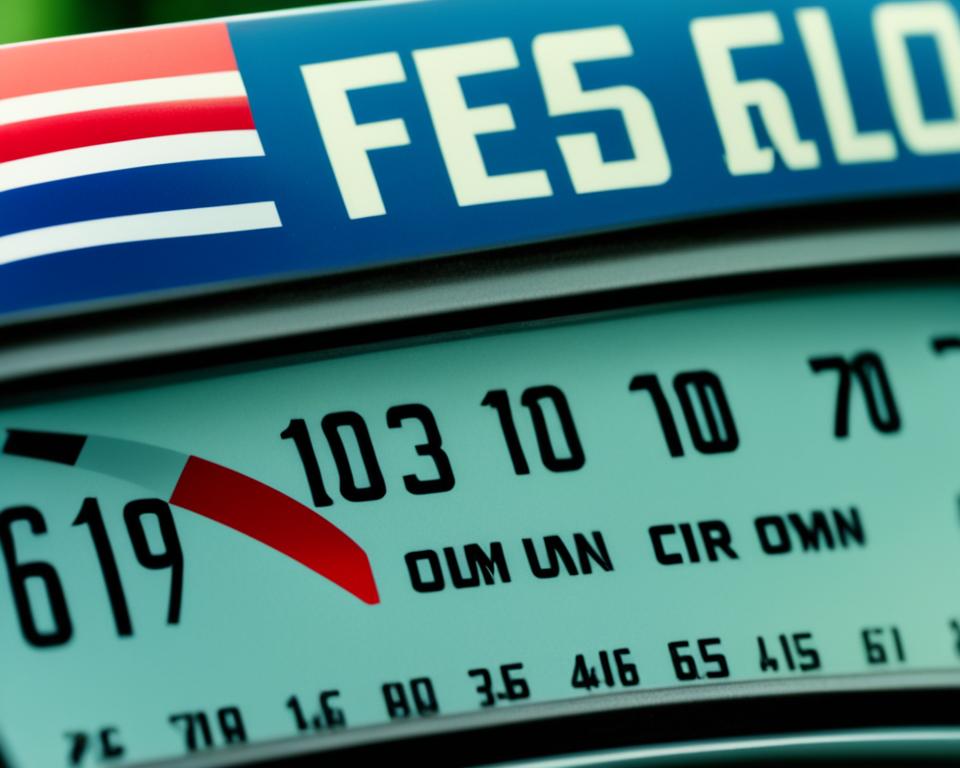
Buying from a Dealer vs. Private Seller
In Costa Rica, expats can choose between buying a vehicle from a dealer or a private seller. Each choice comes with its own benefits and things to think about. It’s important for expats to look into these factors closely to make the right decision for them.
Advantages of Dealerships
Getting a car from a known dealer offers its perks. For starters, dealers often add warranties to the cars they sell. This means you’re protected from surprise mechanical issues. The whole buying process at a dealership is clear and organized, which helps if you’re new to buying cars in Costa Rica.
Dealerships also sometimes have financing options to help out. But, these might mean higher interest rates for expats compared to locals.
Benefits of Private Sales
Buying a used car from a private seller could save you money through negotiation. It’s a more casual experience, letting you talk straight with the seller. You might learn more about the car’s background and how well it was looked after this way.
Yet, buying privately can be riskier. This is because the sale rules might not be as clear. It’s smart to be careful and have the car checked by a mechanic you trust before you buy.
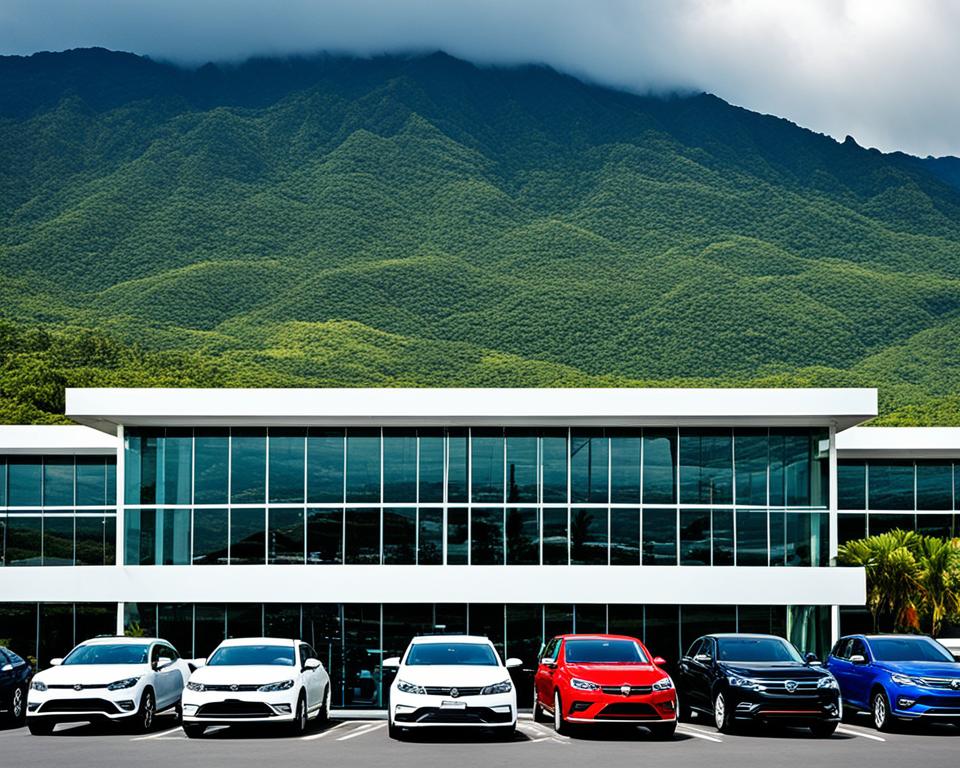
Vehicle Inspection and Documentation
Expat buyers, whether from a
dealer
or a
private seller
, must inspect the vehicle well. Check
documentation
to see it’s complete. Make sure the
Marchamo (registration and mandatory insurance)
and
Riteve (safety inspection)
are current.
Marchamo and Riteve Verification
The
Marchamo
, a yearly fee for insurance, is essential. It’s risky to drive without it and leads to fines. Cars must also pass a
Riteve
safety check each year. New cars get a 2-year pass before needing their first check.
Professional Inspection Recommendations
Yet, checking the Marchamo and Riteve isn’t enough. A
professional mechanic should look over the car
thoroughly. This way, unseen problems can be brought to light. Buyers can then decide wisely and even bargain for a better deal.
Financing Options for Car Buyers in Costa Rica
Buying a car in Costa Rica means looking at several ways to finance it. You can check what the dealerships offer. Plus, the local banks know about car loan options in Costa Rica. Yet, getting a loan might cost more or be harder for people from abroad.
Dealership Financing Plans
Car dealerships offer ways to finance your car, too. This way can make it easy for newbies to buy a vehicle. But, the interest rates and terms might not be the best deal out there. It’s smart to think twice about what a dealership is offering.
Local Bank Loans and Incentives
Along with dealerships, you can look into local bank loans. Though, car loan options in Costa Rica for non-citizens could have higher rates. Yet, there might be some good special deals for expats. Do your homework and compare different banks to get the best deal.
| Financing Option | Interest Rates | Loan Terms | Eligibility Criteria |
|---|---|---|---|
| Dealership Financing | Varies | Typically 3-5 years | Open to both residents and expats |
| Local Bank Loans | Just under 6% in dollars, over 8% in colones | 3-4 years for expats, up to 5 years for residents | More challenging for expats, but some special incentives may be available |
It pays off to check all your auto financing options in Costa Rica. By doing so, you’ll find a good way to pay for your car. This will help with the costa rican car taxes and fees and the vehicle ownership transfer in costa rica.
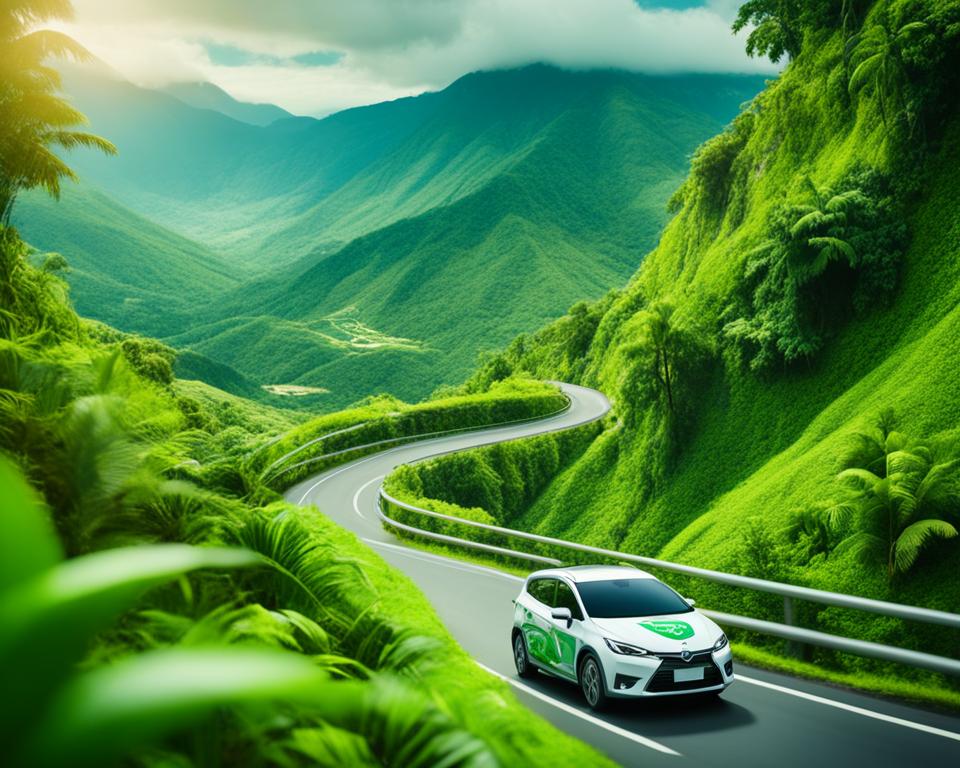
Buying or Selling a Vehicle in Costa Rica
In Costa Rica, buying or selling a car involves specific legal steps. For this, a public notary must be part of the process. The notary is key in making sure everything follows Costa Rican laws.
Legal Requirements and Notary Involvement
If you want to buy or sell a car in Costa Rica, you’ll need a public notary. This person creates the official sale agreement (called Escritura de Traspaso). They check the car’s info and make sure the change of ownership gets recorded properly.
Costa Rica carefully controls its car market to protect everyone involved in a sale. Both the buyer and seller need to meet all legal and paperwork rules. This makes sure the whole process is clear and avoids any problems later on.
Transfer of Ownership Process
Changing a car’s ownership in Costa Rica requires both the buyer and seller to do certain things. These steps are important for a safe and legal sale. Here’s what they should do:
- Make sure the car is up-to-date on its registration and inspections, like having valid liability insurance and passing a safety check.
- A notary will then write up the sale document (Escritura de Traspaso). They also make sure the new owner’s name gets legally updated.
- Buyers need a valid driver’s license. This is true for both locals and visitors buying a car in Costa Rica.
- If you’re selling the car, a pre-sale check by a professional is a smart idea. It assures the buyer that the car is in good shape.
Deeply understanding the law and how ownership changes hands helps both natives and newcomers in Costa Rica. Knowing these steps gives confidence when dealing with selling or buying cars here.
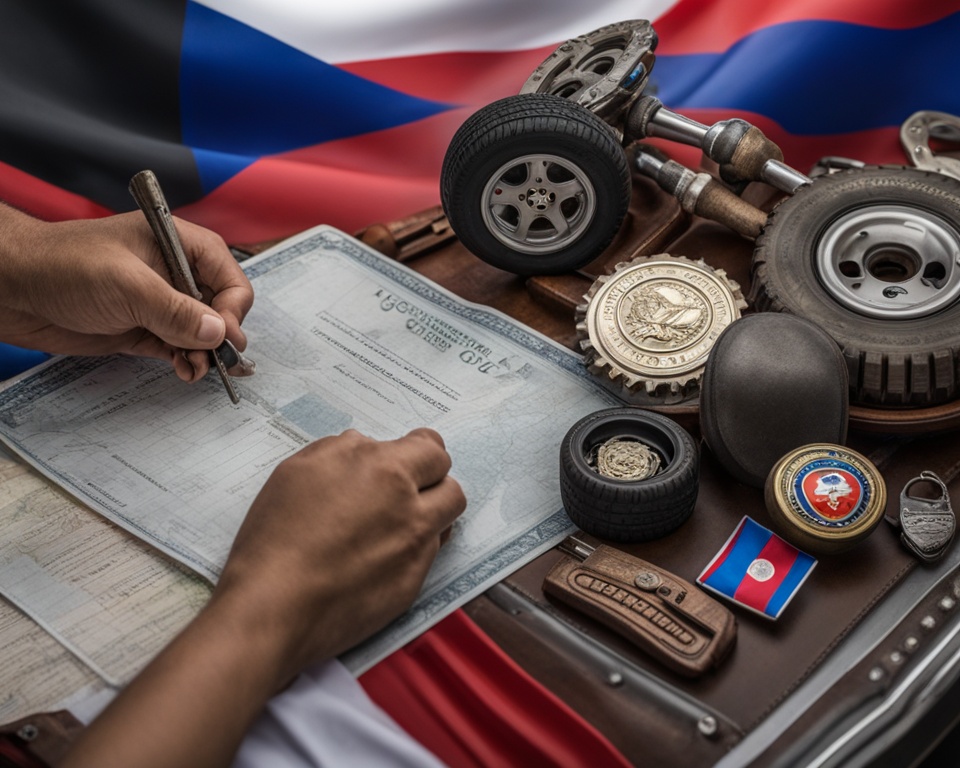
After-Sale Services and Support
Once you buy a car in Costa Rica, it’s crucial to know about the after-sale services offered. These can make your car ownership experience better. This is especially important if it’s your first time in the Costa Rican car market or if you’ve imported a car.
Maintenance and Service Centers
You’ll need reliable places for keeping your car well-maintained. In Costa Rica, you can find both brand dealerships and local mechanics that work on all sorts of cars. Make sure you pick those who know your car best. Also, don’t forget to mind the automobile taxes that Costa Rica needs.
Warranties and Guarantees
It’s smart to ask about any warranties or guarantees when buying a car, new or used. New cars usually come with factory warranties. And some used cars might have warranties from the dealer or the original manufacturer. Knowing what’s covered can save you from big bills later on.
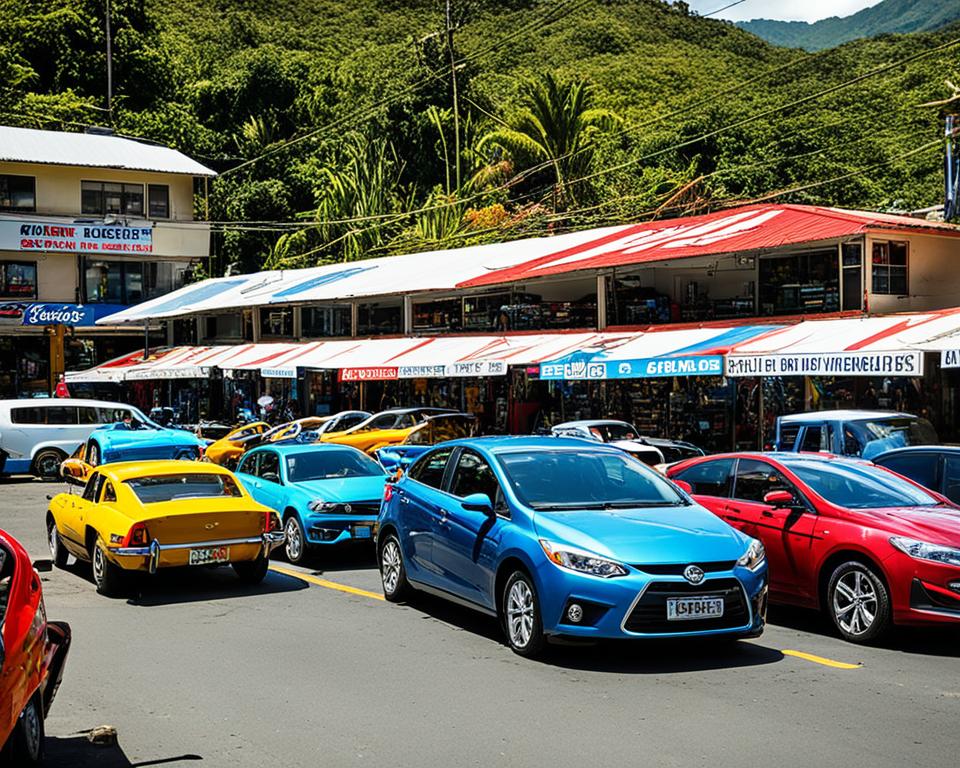
Tips for Negotiating Car Prices in Costa Rica
Buying a car in Costa Rica means you’ll likely negotiate the price, especially with private sellers. It’s key for expats to know how to haggle well. This helps in getting a fair deal. Here are some handy tips:
- Research the Market Value: Begin by finding out what similar cars are selling for. Sites like crautos.com and encuentra24.com are great for this. They show what prices are common in the area.
- Assess the Vehicle’s Condition: Check the car closely for any damages or issues. This can help you lower the price, especially if it needs a lot of work. Make sure to document everything well.
- Understand the Seller’s Motivation: It’s good to know why the seller is parting with the car. This insight can help you during negotiations. A seller needing to sell quickly might be more open to lower offers.
- Start Low and Be Prepared to Compromise: Offering a price lower than what’s asked is a common strategy. But, make sure you’re willing to meet the seller somewhere in the middle. Negotiation is a give and take.
- Leverage Additional Costs: Financial costs beyond the car’s price, like import duties, can be a good point to negotiate. It might help lower the selling price.
- Negotiate Financing and Extras: If the seller is providing financing or extras like a warranty, try to get a better deal on these. This can save you money in the long run.
Using these strategies and being both patient and persistent can help you net a great deal on a car in Costa Rica. Always aim for a price that’s fair, considering the car’s state and your budget.
Common Challenges and Scams to Avoid
Expats should watch out for challenges and scams when transferring vehicle ownership in Costa Rica. Problems with vehicle registration and import regulations can pop up. Plus, some sellers may not be honest in the costa rican car sales market.
One scam to be careful of is vehicles being sold with bad or missing costa rican vehicle registration papers. Always check the documents, history, and ownership before buying. This ensures the sale is legal and safe.
Finding hidden problems or damage in used cars is another issue. It’s smart to have a mechanic you trust check any car you’re thinking of buying. This can save you from expensive fixes later.
Be on the lookout for common car buying scams like tricking with different models, rolling back odometers, or untrue claims about the car’s condition. It’s important to keep your eyes open and do your homework. This way, you can avoid getting ripped off.
Knowing about these issues and being careful can help expats go through the vehicle ownership transfer costa rica process smoothly. This means less chance of problems or getting caught up in unethical deals.
Resources for Expats Buying or Selling Cars
Expats in Costa Rica can find help in buying or selling cars through various resources. These include tools and people that give important tips, guidance, and help during the process.
Online Platforms and Communities
Online, sites like CR Autos and Encuentra24 help people list their cars. CR Autos mainly has cars from dealers. However, both sites work well for buying from dealers or private sellers. They make it easy for expats to look through many cars and reach local sellers.
Also, social media groups and forums for expats in Costa Rica share a lot. They recommend places, give tips, and talk about their own car buying or selling tales. Such stories can make it easier for new folks to understand the local car market better.
Local Contacts and Recommendations
It helps to know local people, like car dealers or mechanics, if you’re buying or selling a car. Tips from other expats or locals can point you to the good service providers. This way, your deal can be more straightforward and clear.
For instance, recommended car mechanics are key in Costa Rica. They can check a car before you buy it, spot problems, and give upkeep advice for the area. Local car dealerships that serve expats are also a great help. They might ease the purchasing process with their know-how, financial help, and by sorting out the paperwork.
| Resource | Description |
|---|---|
| CR Autos | A popular online platform in Costa Rica with more dealer cars. |
| Encuentra24 | A popular site for listing cars that features dealer and private seller vehicles. |
| Expat Car Buying Communities | Online groups where expats chat and give advice on getting cars in Costa Rica. |
| Recommended Car Mechanics | Local auto shops praised for their car checks and maintenance work in Costa Rica. |
| Local Car Dealerships | Well-regarded car sellers in Costa Rica known for their help to expats buying a car. |
By using these resources wisely and making local connections, expats can have a smoother experience buying or selling their car in Costa Rica.
Conclusion
In conclusion, buying or selling a car in Costa Rica can seem tricky at first for expats. Yet, with the right steps and info, it can become easy. This guide gives a detailed look at what to consider and the steps needed for a successful car deal.
To get it right, expats should learn about the local car market and set their budget carefully. They should also use the help and info available. This way, they can find a car that meets their needs without breaking the bank. This guide covers everything from learning about cars in Costa Rica to understanding the legal side of car deals. It’s all you need to make a smart choice.
Being prepared is key. This guide aims to help expats be ready for buying or selling a car in Costa Rica. It talks about the special rules and things to keep in mind when dealing with cars in this country. With the advice and tips here, anyone can smoothly get a car and enjoy driving in Costa Rica.
FAQ
What are the main options for expats to obtain a vehicle in Costa Rica?
What are the pros and cons of importing a vehicle versus buying locally?
What factors should expats consider when researching the Costa Rican car market?
What are the key differences between buying a new versus used car in Costa Rica?
What additional costs should expats budget for when purchasing a car in Costa Rica?
What are the key considerations when buying a car from a dealership versus a private seller?
What legal requirements and documentation are involved in buying or selling a vehicle in Costa Rica?
What after-sale services and support can expats expect when purchasing a car in Costa Rica?
What are some common challenges and scams to be aware of when buying or selling a vehicle in Costa Rica?
What resources are available to help expats navigate the car buying or selling process in Costa Rica?
Source Links
- https://quatro.legal/buying-a-car-in-costa-rica/
- https://crie.cr/buying-and-selling-vehicle-in-costa-rica/
- https://costaricalifegroup.com/blog/The-Ultimate-Guide-to-Buying-a-Car-in-Costa-Rica
- https://www.twoweeksincostarica.com/buying-a-car-in-costa-rica/
- https://osatropicalproperties.com/blog/importing-a-car-to-costa-rica-or-buying-a-car-in-costa-rica-which-is-right-for-you
- https://flamingobeachrealty.com/a-guide-to-buying-a-car-in-costa-rica-what-you-need-to-know/
- https://www.costarican-american-connection.com/having-fun-buying-a-used-and-new-car-in-costa-rica
- https://www.livingcostarica.com/costa-rica-living/buying-a-car-in-costa-rica-and-tips-to-a-successful-purchase/
- https://ticotimes.net/2011/03/11/cash-or-credit-car-financing-options-for-expats
- https://www.gaprealestate.com/buying-or-selling-a-vehicle-in-costa-rica/
- https://mytanfeet.com/costa-rica-travel-tips/costa-rica-tourist-scams/
- https://www.costaricavibes.com/common-scams-in-costa-rica/
- https://www.twoweeksincostarica.com/buying-a-car-in-costa-rica
- https://startabroad.com/locations/costa-rica-country-guide/costa-rica-buying-a-car

